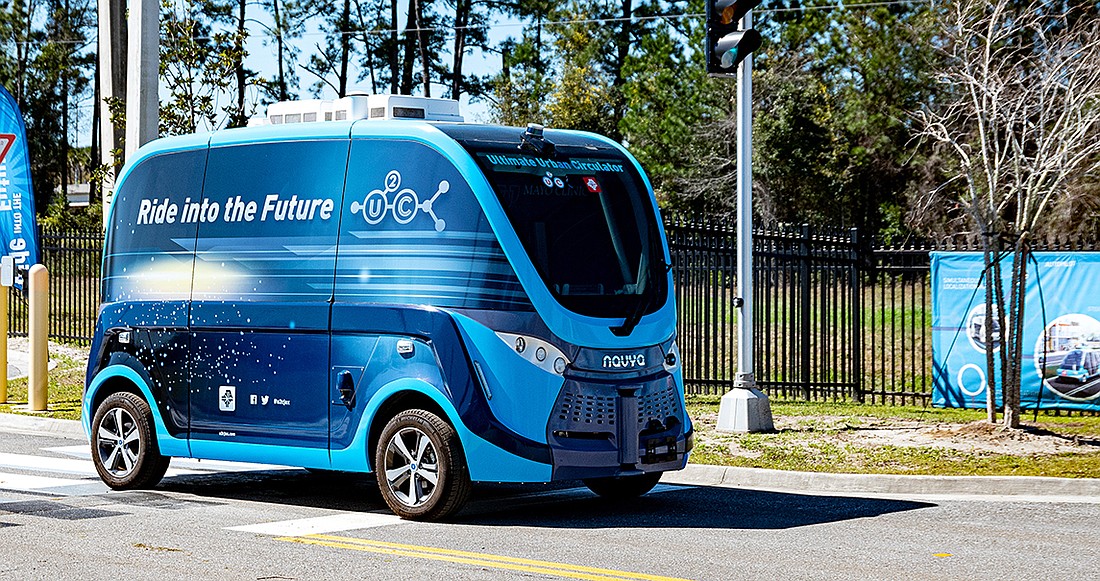Special Offer: $5 for 2 Months!
Your free article limit has been reached this month.
Subscribe now for unlimited digital access to our award-winning business news.

The Jacksonville Transportation Authority signed a contract for more than $49 million with Balfour Beatty LLC — Vision 2 Reality Team to bring autonomous vehicles to Bay Street Downtown.
The JTA board voted 5-0 on Jan. 27 to allow CEO Nathaniel Ford to execute the deal for design-build services for the first phase of the proposed Skyway modernization called the Ultimate Urban Circulator.
The $49.04 million contract is about $5.04 million more than the $44 million budget JTA gave the U.S. Department of Transportation in a grant application in May 2020 for what is called the Bay Street Innovation Corridor.
JTA Vice President of Automation Bernard Schmidt said after the board meeting that the deal with Balfour Beatty locks in a $3.2 million price for 30% of the design.
He said the rest of the cost to design, build, maintain and operate the innovation corridor could change as the project develops.
“There might be nuances, changes and decisions that are made that might drive that pricing up or down,” Schmidt said.
“We feel really confident that that price will be well in the ballpark.”
The innovation corridor’s 3-mile route along Bay Street is part of JTA’s estimated $379 million to $400 million U2C plan to replace the elevated monorail with a 10-mile automated vehicle network.
According to JTA, Balfour Beatty’s design-build contract will result in 12 to 15 autonomous vehicles in service on an at-grade loop along Bay Street from Hogan Street to the Sports and Entertainment District near TIAA Bank Field, 121 Financial Field and VyStar Veterans Memorial Area.
The contract gives Balfour Beatty a seven-month deadline to reach 30% design of the innovation corridor.
The Balfour Beatty group is a consortium comprising Superior Construction Co. Southeast; Beep Inc.; WGI, Inc.; Stantec Consulting Services Inc.; Miller Electric; Urban SDK; and Balfour Beatty.
The Jan. 27 signing is the culmination of negotiations that began after the board awarded the project in August.
Balfour Beatty was the lone bidder.
JTA will pay Balfour Beatty through federal, state and authority money secured over the past three years.
The board unanimously approved a $14.2 million appropriation to pay the remaining balance of the contract cost.
The other funding includes a $12.5 million U.S. Department of Transportation BUILD grant; $13 million from the Florida Department of Transportation; $1 million from the Transportation Planning Organization; and $8.3 million JTA budgeted in fiscal year 2020.
After the meeting, Ford called the signing a major accomplishment for JTA and its staff.
“We are in the active project development phase now,” he said.
Local vs. federal dollars
Ford said moving the U2C into development will make JTA more competitive with other cities and transportation authorities seeking money from the $1.2 trillion federal infrastructure law signed by President Joe Biden in November.
Ford said the law will have competitive funding related to autonomous vehicles and electrification projects.
According to Ford, U.S. DOT officials are familiar with the U2C project from other grants, but JTA has not applied for money from the infrastructure law.
In May, City Council dedicated $247 million from the local option gas tax increase that JTA will use for U2C second phase to convert the existing Skyway rail into an elevated track for the autonomous vehicles.
JTA has received other federal funding.
The agency announced in November it would receive a $1.72 million RAISE Grant in support of the U2C’s third phase, which is the neighborhood extensions.
U2C and Local Motors
Schmidt said reaching the 30% design threshold will give JTA a better idea of what autonomous vehicle model will work best.
JTA and Balfour Beatty likely will choose the vehicle when the U2C design reaches the 60% mark, Schmidt said.
JTA has worked with seven vehicles and four autonomous software platforms since 2017 at its Armsdale Test & Learn facility.
One of those vehicles could be out of the running.
Local Motors former Vice President of Sales and Customer Success Chris Stoner said in a LinkedIn post this month, first reported by online technology news site TechCrunch, that the Arizona-based startup would “cease to exist” Jan. 14.
The future of Local Motor’s 3D-printed Olli 2.0 autonomous shuttle in JTA’s test-and-learn program is uncertain.
Local Motor co-developed the Olli 2.0 with Beep and Robotic Research LLC.
JTA announced in September 2020 it was adding the electric vehicle to its autonomous vehicle testing program.
Schmidt said the U2C program has stayed purposefully “vehicle agnostic.”
He said Local Motor’s shutdown is a restructuring. He said JTA will wait to see if the vehicle still can be in the U2C vehicle testing process.
“What that means is we will remain nimble and can flex between different types of vehicles,” Schmidt said.
“It’s always kind of a risk with a lot of startups and this technology being so new, you’ll see other players that are going to come and are going to go.”
Your free article limit has been reached this month.
Subscribe now for unlimited digital access to our award-winning business news.